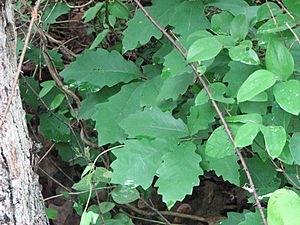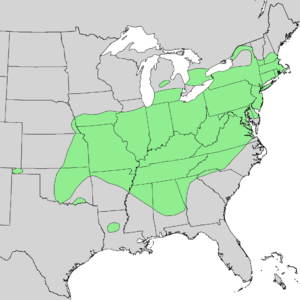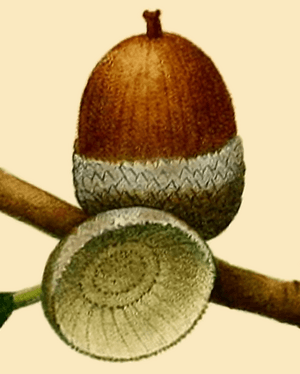Dwarf chinkapin oak facts for kids
Quick facts for kids Dwarf chinkapin oak |
|
|---|---|
 |
|
| The leaves of Q. prinoides (center) resemble those of Q. prinus. | |
| Conservation status | |
| Scientific classification | |
| Genus: |
Quercus
|
| Species: |
prinoides
|
 |
|
| Range map | |
| Synonyms | |
|
List
Quercus castanea var. prinoides (Willd.) Muhl. ex Engelm.
Quercus chincapin (F.Michx.) Raf. Quercus chinquapin Pursh Quercus muehlenbergii var. humilis (Marshall) Britton Quercus prinoides Raf. Quercus prinoides var. rufescens Rehder Quercus prinoides f. rufescens (Rehder) House Quercus prinus var. chincapin F.Michx. Quercus prinus var. humilis Marshall Quercus prinus var. pumila Michx. Quercus rufescens (Rehder) E.P.Bicknell |
|
The dwarf chinkapin oak (scientific name: Quercus prinoides) is a special kind of oak tree. It is also known as dwarf chinquapin oak, dwarf chestnut oak, or scrub chestnut oak. This plant usually grows as a shrub, which is like a small, bushy tree.
It is found in eastern and central North America. You can see it from New Hampshire all the way to southern Ontario in Canada. It also grows south to states like Georgia, Alabama, Louisiana, and Oklahoma. This oak often grows in groups, forming what are called clones. This means many plants grow from one original plant using underground stems.
Contents
About the Dwarf Chinkapin Oak's Name
The dwarf chinkapin oak got its name from a German scientist named Carl Ludwig Willdenow. He described this plant in 1801. The word prinoides in its scientific name means "resembling Quercus prinus." Quercus prinus is the chestnut oak.
Even though its name sounds like chestnut oak, the dwarf chinkapin oak is actually more closely related to the chinkapin oak (Quercus muhlenbergii). Sometimes, scientists thought these two oaks were the same species. But now, most agree they are different.
What Does the Dwarf Chinkapin Oak Look Like?
The dwarf chinkapin oak is usually a shrub or a small tree. It typically grows to be about 13 to 20 feet (4–6 meters) tall. It can also spread out to be 13 to 20 feet (4–6 meters) wide. It often spreads by sending out underground stems called rhizomes.
Leaves and Acorns
The leaves of this oak look a lot like those of the chinkapin oak. However, the dwarf chinkapin oak's leaves are smaller. They are usually 2 to 6 inches (5–15 cm) long. The chinkapin oak's leaves are longer, about 4 to 7 inches (10–18 cm).
The acorns of the dwarf chinkapin oak are about 1/2 to 1 inch (15–25 mm) long. Their cup covers about half of the acorn.
Where It Grows
You can tell the dwarf chinkapin oak apart from the chinkapin oak by where they grow. The chinkapin oak likes rocky places with lots of calcium. But the dwarf chinkapin oak prefers dry, sandy soils. These soils are often a bit acidic. It can also grow on dry shales.
Like other white oaks, Q. prinoides has acorns that taste sweet. These acorns grow and ripen in just one season. They start to sprout as soon as they fall to the ground. They do not need to wait through winter. This oak can also mix with other white oak species to create new types of oaks. It starts making flowers and seeds when it is about 3 to 4 years old.
Uses and Wildlife
The sweet-tasting acorns of the dwarf chinkapin oak are a favorite food. Many kinds of wildlife eat them, and people can eat them too!
The wood from this plant is not used much for building or other commercial things. This is because the plant usually stays small and shrub-like.
See also
 In Spanish: Quercus prinoides para niños
In Spanish: Quercus prinoides para niños



